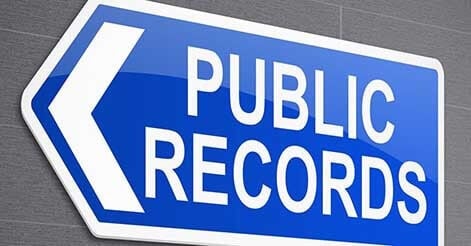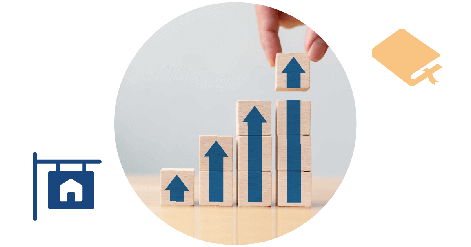How Public Records Power Smart Real Estate Decisions

PropertyRadar provides smart small businesses with a hyperlocal marketing app to research and access property data and owner information to discover their best potential customers. Much of that hyperlocal marketing data is based on public records. To be successful using PropertyRadar, it’s important that you understand public records, their strengths, and their weaknesses.
Public records are data, documents, and transactions that are officially recorded with a government entity as an evolution of common law rights to access court records.
Examples of public records include census records, real property transactions, assessor’s data, court dockets, criminal records, license data, voter registration and much more.
Public records are a gift to small business.
Public records hold individuals and businesses accountable by making certain types of transactions transparent. Transparency reduces fraud and encourages fair business dealings. For example:
- The county tax assessor can’t lower his friend’s tax bill without subjecting it to public scrutiny
- A lender can’t protect their security interest in a property without exposing the terms of the loan to the same scrutiny
- One person can verify that another person owns property claimed by that second party. This is super important for contractors, renters, lenders, etc.
- And much more, all serving the public interest.
When it comes to growing your business, public records are an amazing resource for researching your market, identifying your best potential prospects to become new clients and understanding them well enough to connect with them and ultimately secure their business. Big businesses have successfully leveraged public records as a marketing resource for years. Now, smart small businesses can too.
Public records are messy.
There are thousands of local, county, state and federal government offices that keep public records. The requirements for creating and storing those records vary widely and many of the rules around them were created before computers even existed, making the available data inconsistent. Errors as simple as the dreaded “typo” are common.
These errors, when discovered, are usually easily resolved on an individual basis, even though the records themselves cannot often be corrected, only appended with an updated record noting the error. Unfortunately, with billions of documents in the public record, errors and omissions are quite common. Despite these problems, having access to this data provides huge advantages compared to doing the same research on your own, without that same access.
Public records can be scary.
Public records are a cornerstone of civil society; however, the amount of information about each of us that is available and accessible can be quite surprising, even scary. Once your information is part of the public record, it is essentially impossible to remove, even if it is incorrect. It’s tempting to say this information shouldn’t be public, but the alternative would allow bad actors to hide just as easily. A society lacking the transparency of public records is far scarier, in our opinion.
Public records are a privilege.
Despite access to public records being an inherent right embedded in the First, Fourth, Sixth and Fourteenth Amendments of the United States Constitution – not to mention its inclusion in the Freedom of Information Act – access to this data is a privilege that could ultimately be lost if it is abused. On PropertyRadar’s part, the User Agreement clearly outlines that we will cooperate with law enforcement if anyone uses our product for nefarious purposes.
Is everything in PropertyRadar from public records?
While public records are our primary source of data, we provide lots of additional information and data to our users. Some information is estimated from public records using computer models and some data is bought from third parties.
When you allow a company to access your address book or social media account in exchange for using their product, they are collecting the information publicly provided. For example, if you fill out a survey for the chance to win something or sign up to receive a free subscription to a magazine, there’s a good chance that the company is making money by reselling your data.
While we are in the business of buying that data for our customers to use, we do not sell our customer’s data. Please refer to our Privacy Policy and be sure to review the policies of any companies before giving them your personal information.
The PropertyRadar hyperlocal marketing resource refinery.
Think of the information that you see in PropertyRadar as the refined product from a ceaseless flow of unrefined data coming to us through pipelines. We have hundreds of pipelines of this “crude data” coming into the PropertyRadar “refinery” all day, every day.
As our refinery receives the “crude data,” we process it into the refined data you see in the PropertyRadar hyperlocal marketing app, including the Explore function for data visualizations, search results, content for your lists and in each Property Profile.
The process of refining this data uses the many algorithms we’ve crafted over more than 10 years to inspect, clean, flag, parse, match, validate, verify and ultimately make available for our users through neatly organized lists.Is it perfect? No. And it never will be. But this platform is no worse than what big businesses are using and in many cases it’s superior.
Public records are thriving in the data-driven world of business.
Contrary to what Google, Facebook, and social media gurus may want you to believe, public records remain a powerful foundation for hyperlocal marketing campaigns for smart business owners to win new customers and steadily grow their business.
For many small local businesses, public records are the only means of finding their new customers without wasting most of their marketing spend reaching out to unqualified prospects. Local businesses who need to discover new homeowners find that only public records can deliver the knowledge and insights they need to connect with their best potential client effectively, and often in ways that surpass the most sophisticated digital advertising network programs.
Small businesses often get caught up in the “bright, shiny object” fever of social media marketing and end up neglecting hyperlocal marketing through public records as an advantage. Obviously, a Facebook advertising guru is going to want you to believe that EVERYONE is on Facebook and it’s the BEST way to advertise because that works for their business, but it may not always be the best for your business.
If your competitors are caught up in the same digital advertising fever, their mistaken lapse in hyperlocal marketing efforts can translate into a bottom-line opportunity for you.
For all the positive insights that public records can offer your business, it’s important to also know their strengths, weaknesses and your responsibilities when using them.
Your data, my data, and everyone’s data. Everywhere.
“The best minds of my generation are thinking about how to make people click ads. That sucks.”
— Jeff Hammerbacher, data scientist for Facebook & Cloudera, April 14, 2011
You likely own a smartphone. It’s a safe bet because there are over 400 million wireless subscribers in the United States, yours included.
Have you ever wondered why it’s called a smartphone? Does it really make you smarter? We don’t think so. It’s called a smartphone because it makes big businesses smarter about you and it makes them a lot of money.
Each year, that smartphone will contribute over 60 gigabytes of data about you and your behaviors to your network provider and whomever they sell it to. Though the number of data points your behavior contributes depends on the number of apps and social media services you use, the number of advertisements you click on and websites you visit, that number is in the billions.
Now, to get a better understanding on the amount of information available, multiply your data contributions by the other 400 million wireless subscribers. Then add to that the data gathered from more than 300 million households in the U.S. that have at least one computer connected to the internet. Finally, include intel gathered from all of those IoT devices, like your Fitbit and Amazon Echo, as well as data on your shopping habits, financial transactions, any forms you’ve filled out, and the social media services you use. The amount of information that is available and accessible is staggering.
Small data for small businesses.
Big data dominates the headlines. The amount of personal and behavioral data contributed to big business conglomerates in America is beyond belief and they are making billions in revenue just from selling and buying data among themselves. The ultimate purpose is to achieve better advertising and marketing that’s designed to sell more products and services, ultimately to influence your behavior. Any “free” services you use are being paid for with your data. If it’s “free,” you are the product.
When it comes to data-driven, hyperlocal marketing for business, the advantages have certainly been in favor of big businesses.
Our goal with PropertyRadar is to make available to small business the public records property and owner information data that they need to discover, understand and connect with their best potential customers. Our app delivers small data to smart small businesses.
We started doing this in 2007 with ForeclosureRadar, which we created to provide individual trustee sales investors with better data than bog banks and large institutional investors were able to access.
Big businesses can invest millions of dollars into data sources and the newest, most sophisticated tools. Anything you see in PropertyRadar now, just know that big businesses have been using it for years.


